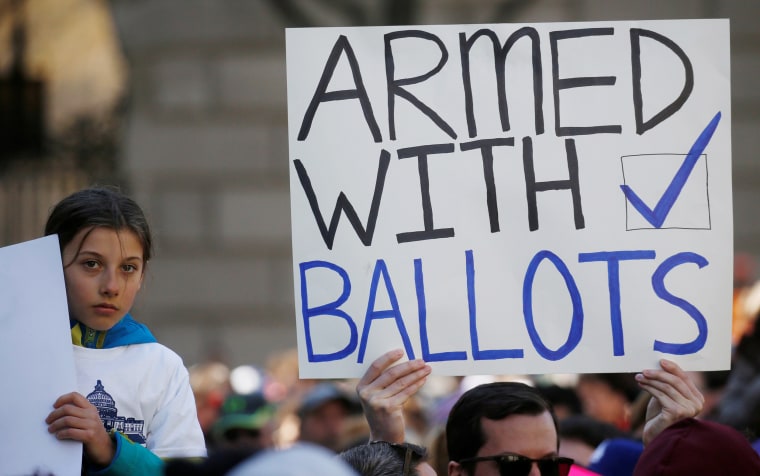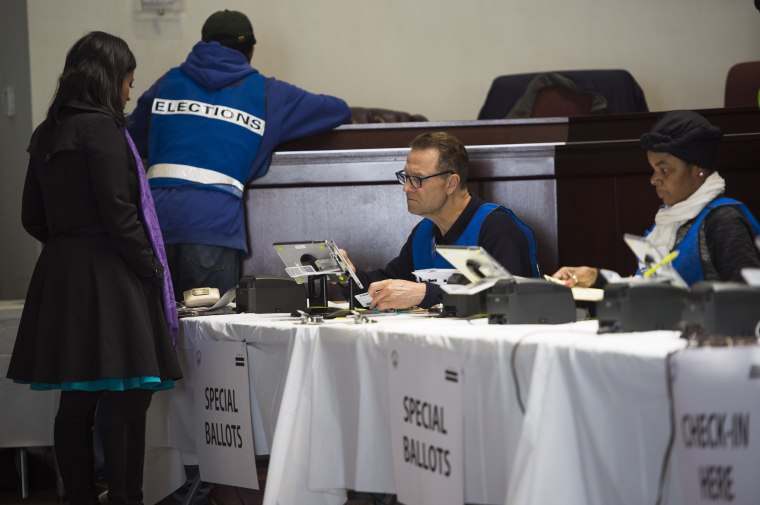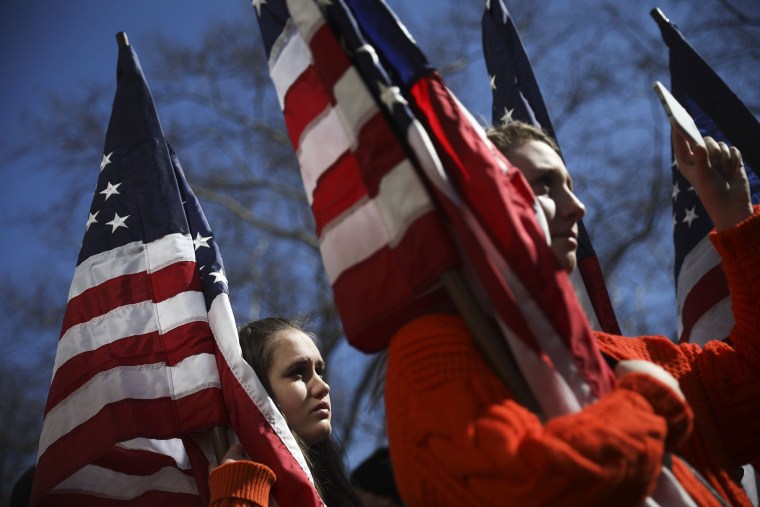WASHINGTON — High school students marched to protest for gun control after the Parkland shooting in Florida and soon they might be marching straight to the voting booth in the nation's capital.
Washington is on track to become the first place in the country to allow people as young as 16 to vote in federal elections, including for president, as the nation glimpses the emerging political power of the generation that follows millennials.
It’s part of a burgeoning movement in the U.S. and abroad as a growing number of cities and states consider ways to expand voting rights to younger people.
"At the age of 16, our society already gives young people greater legal responsibility. They can drive a car. They can work. Some are raising a family or helping their family make ends meet. They pay taxes," said D.C. Councilmember Charles Allen, a Democrat who introduced the bill last week to lower the voting age. "And yet, they can't exercise their voice where it matters most — at the ballot box."
A majority of the D.C. Council, as well as Mayor Muriel Bowser, have already signed onto the bill. The Washington Post has editorialized for passage, arguing that the promotion of civic engagement outweighs concerns about life experience or precedent.
It's a dramatic turnaround from just three years ago, when Allen introduced a similar bill that went nowhere.
He credits the change in part to the eloquence and passion that teenage activists demonstrated in the post-Parkland "March for Our Lives" and nationwide school walkouts to protest gun violence.

"Two years ago, the argument that I would hear people make was, really? Have you met a 16 year old?” Allen told NBC News. "What we've seen over the last several months has just completely eviscerated that argument."
Takoma Park, Maryland, just over the border from Washington, became the first jurisdiction in the country to allow 16- and 17-year-olds to vote in 2013. Since then, a handful of other progressive cities have followed, the largest being Berkeley, California.
But cities only have the power to extend voting rights for municipal elections.
The District of Columbia — both a city and pseudo-state wrapped up into one — could enfranchise 16- and-17-year-olds for all elections, from selecting members of advisory neighborhood councils to the next occupant of the White House.
The downside of the District's status, however, is that Congress has the power to block laws in the Democratic stronghold, and the GOP majority on Capitol Hill has asserted that privilege with gusto, snubbing everything from assisted suicide to legalized marijuana.
Since Parkland, at least two other states, Minnesota and Georgia, have considered bills to expand voting rights to young people, while a half dozen states saw similar legislation introduced within the past year.
None have succeeded, but not because of legal hurdles.
The 26th Amendment, passed in response to youth unrest during the Vietnam War, gave the vote to every 18-year-old. But it does nothing to prevent states from lowering their voting age even further, experts say.

Not much data exists on the political views of the post-millennial generation, which is made up of those born after 1996 and is sometimes called Generation Z or iGen. But if they vote like their slightly older peers, who lean overwhelmingly liberal, the change could be a boon for Democrats.
Recognizing that potential, a coalition of progressive groups recently launched a major push to register high school students to vote in 10 key battleground states in this year's midterms.
"America's children took to the streets and led marches with a unified message that rang out across the country: We need a Congress that will protect us," said former Rep. Gabrielle Giffords, whose gun safety group is involved in the effort. "We are making sure that they have the opportunity to cast their ballots for the first time and truly make a difference."
A number of states already allow young people to pre-register to vote or participate in primary elections if they will be 18 by the time of the general election.
But advocates say the main reason to expand the vote is nonpartisan.
Voting is a habit, and there's research to suggest that 16- and 17-year-olds are more likely to develop that habit than 18-year-olds, who are often moving away from their local community to attend college or start work.
Canada's top election official made a similar case in calling on Parliament to consider lowering the voting age last month, noting, "We know that Canadians who vote early in their lifetime will continue to vote, and those who don't vote in the first few elections will tend not to vote later on."
Austria, Brazil, and parts of the United Kingdom, among others, have also allowed 16-year-olds to vote in some elections.
Critics abound, however. When Allen appeared on a local call-in radio show Monday to promote his bill, he faced plenty of callers who found the idea of 16-year-old voters absurd.
One caller said teenagers should only be able to vote if they can pass a civics test. Another worried about a slippery slope that would lead to 14-year-olds selecting lawmakers.
Fred Schultz, the only member of the Takoma Park City Council to vote against the voting age change, said his mind has not changed, even though he was impressed by the students behind March for Our Lives.
"The vast, vast majority of 16- and 17-year-olds simply lack common sense," Schultz said.
